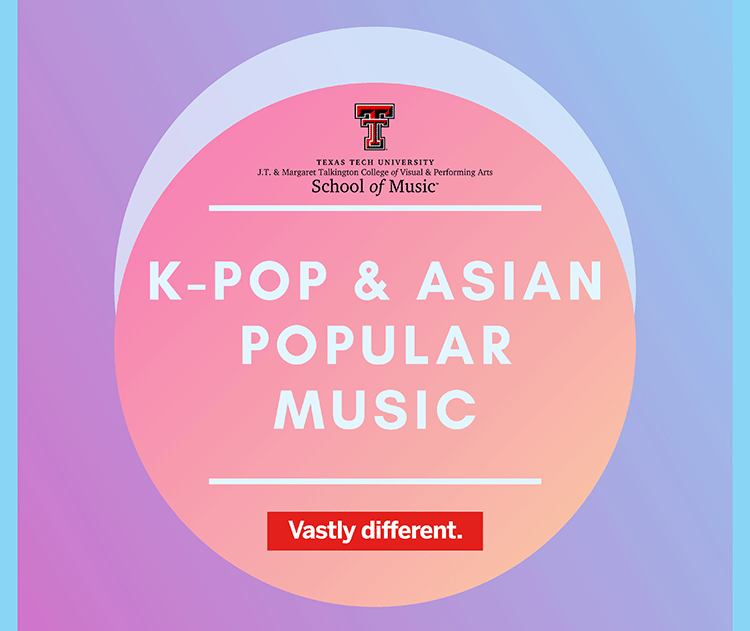
Worldwide phenomenon. Those two words describe Korean popular music’s (K-Pop) takeover of western charts and explosion in global popularity. No longer a niche genre, K-Pop now serves as a vehicle for Texas Tech University (TTU) students to study Asian music and the effects of cultural globalism and issues of "soft power" through music and marketing.
"It's tempting to say that K-Pop is just aimed at the teen to 20s set, but there are devoted fans across all age groups around the globe, even my 10-year-old son," says Associate Professor of Musicology Stacey Jocoy, Ph.D. "The connections to other related media including J-Pop, Anime, and K-Drama should not be under-estimated; together these connected media are an important index of an expanding awareness and appreciation of Asian culture."
Jocoy's focus is on intersections between politics, popular devotional forms, staged music, and vernacular song of the fifteenth through eighteenth centuries. She appears in publications such as the Journal of Seventeenth-Century Music, ECCB: Eighteenth-Century Current Bibliography, Eighteenth Century Theory and Interpretation, Literature Compass, and Musik in Geschichte und Gegenwart.
In the book of world music, Asian pop music does not have a chapter until after the mid-90s. Military dictatorships in South Korea stifled any creative breakthrough until 1992 when Seo Taiji and Boys release "Nan Aroya." The song is influenced by Cypress Hill and a grand departure from fledgling metal music Seo produced in Japan. Considering most western music was banned, the song is a cultural breakthrough—an ignition.
The 1997-1998 economic crisis made it financially burdensome to import from America and Europe, so Koreans focus on producing local entertainment. An explosion of television dramas, film, music, and dance happens. With the rise of mass media such as satellite television and the (soon-to-be everywhere) internet, Korea has something to export to hungry content consumers.
"The Korean products, because of the economic crisis, are ridiculously cheap," explains Distinguished Guest Professor Keith Howard, Ph.D. "So, we see K-Pop first moving to Taiwan then to China—it has always had a presence in Japan—from there to the rest of Southeast Asia and satellite broadcasts the product everywhere."
Howard is a Professor of Music at the University of London. His focus on Korean popular culture started in 1982, as part of his lifelong interest in "how people use and talk about music, religion, composition, education, preservation and sustainability, commodification and commercialization, traditions, and musical futures."
At the turn of the millennium, it's not music that is the popular Korean product. Korean films are the leading cultural export with music in tow to serve as theme.
"We're not buying the pop music so much as we are buying the films, and the music comes with it," Howard notes. "For the media companies in Korea, exporting your K-Pop star is part of supporting other industrial production and consumption...K-Pop is not about selling K-Pop music, it's about selling Korea."
Prosumers are continuing the wave of Korean popular culture. What had been Korean government or company support is now fans who are into K-Pop are persuading others to buy Samsung products or even travel to Korea on vacation. They are expanding the social footprint of Korean pop by sharing self-produced videos and other content. Of note to Howard is that the fans pursuing studies in Korean culture are considered minorities in their own.
"Is it marketing or is it not," asks Howard. "It suggests Korea is doing something which essentially other homelands are not yet doing successfully."
According to Jocoy, this course considers aspects of Asian diaspora and beyond that to fandom studies, looking at how and why peoples from all walks of life become fans of remote musical styles and stars. Howard will examine the idol system of K-Pop and the training one must go through to become a Korean pop star.
Majors and non-majors can register for MUHL5320/MUHL4300/MUSI2000. Please contact stacey.jocoy@ttu.edu if any permission is needed.
